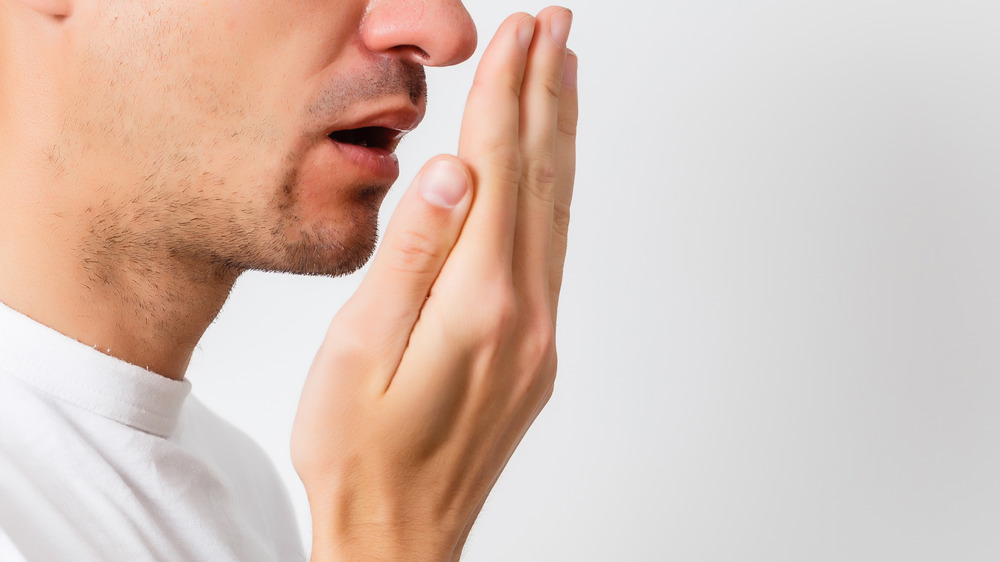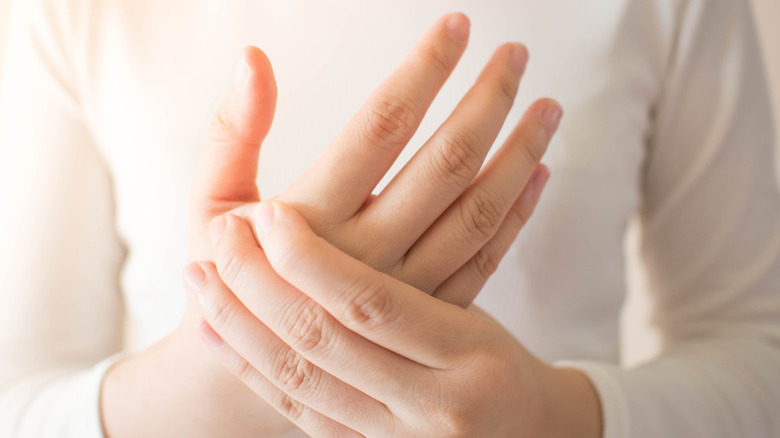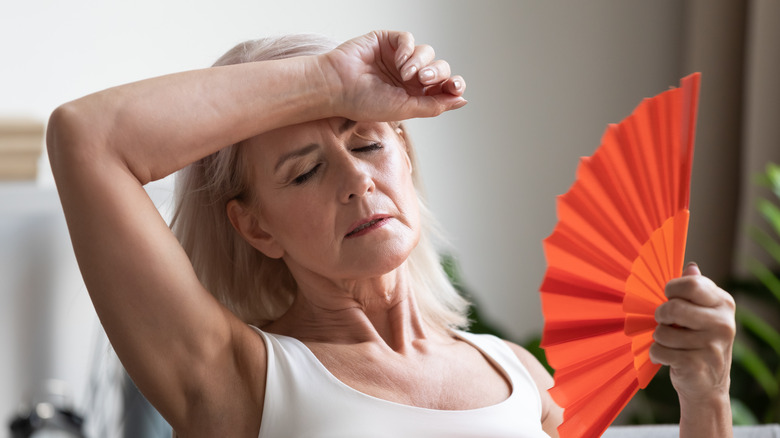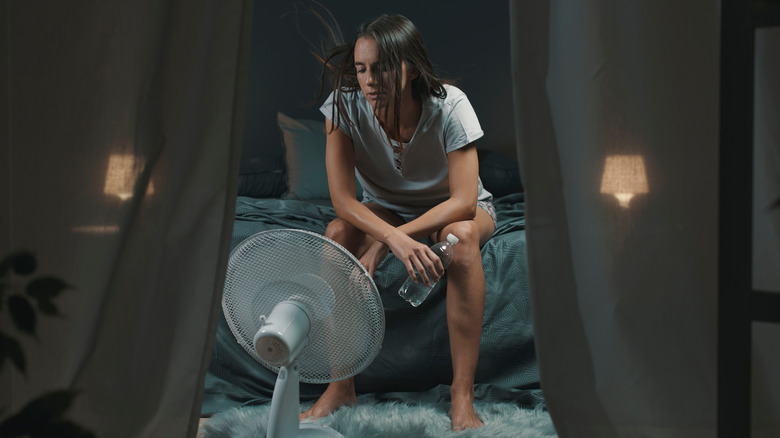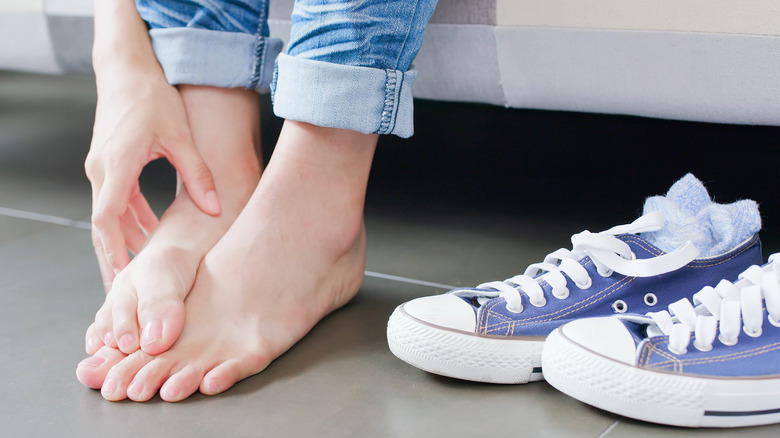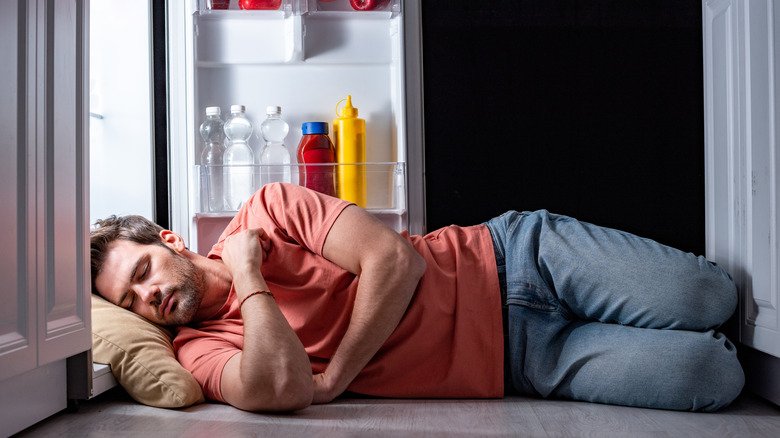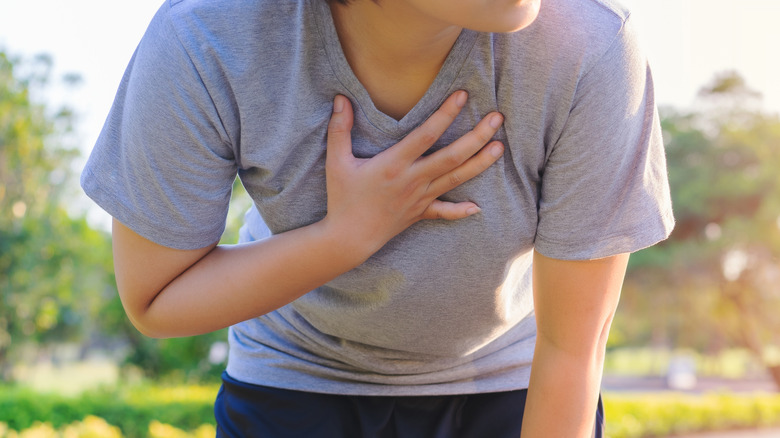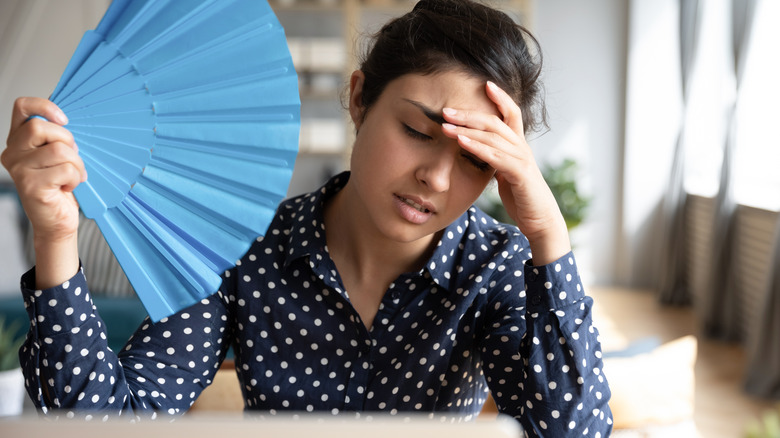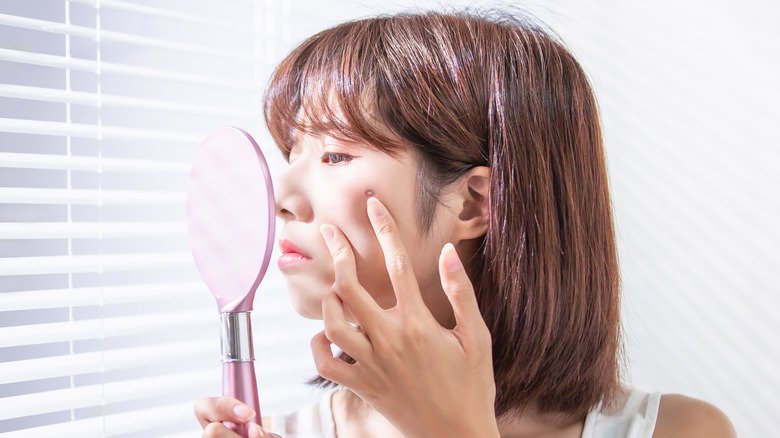Strange Things That Happen To Your Body In The Summer
Do you usually head out on a vacation come summertime? Many people had to put summer travel plans on hold in 2020; a survey from Value Penguin found that 72 percent of Americans didn't take a summer vacation that year. However, 32 percent of survey participants said they were planning a bigger, better vacation for 2021.
And it's only natural that if you're planning a big summer blowout, you might be feeling a bit out of touch with your body and how it might react to lying on a beach in the blazing sun (doesn't that sound just lovely?). Our bodies adapt and change when the weather gets hotter, and some of the things that occur when the mercury rises could seriously surprise you. So get prepped for the heat, and join us as we take a look at all the strange things that happen to your body in the summer.
In the summer, you may have bad breath
We all like to smell good, but you could end up smelling worse come summer — and not just because you're a little sweatier. Hotter weather can leave people with a case of halitosis, the medical term for bad breath, per Johns Hopkins Medicine.
Halitosis can be caused by many things, from poor dental hygiene and tobacco products to health conditions like chronic bronchitis or periodontitis. However, according to bad breath and halitosis expert Dr. Harold Katz, halitosis can also occur through the changes in weather and behavior that occur in the summer months.
As he told Metro, "It won't come as a big surprise that we need to drink more water throughout the warmer months as the body loses more water naturally through sweating. That coupled with an increase in the use of hay fever medications, fad summer dieting, an increase in outdoor exercising and over exposure to the sun can also all exacerbate the problem [of bad breath]." So if you're noticing that your breath is a little funkier, take note of how you might've reacted to the heat.
Your hands can swell up in the summer
Have you ever noticed that your rings feel tighter when it's hot outside? Well, we're here to tell you that you're not imagining things. According to Dr. Tammy Olsen Utset, an associate professor in the rheumatology department at the University of Chicago, this is due to how our blood vessels react to changes in temperature.
As Utset explains in Prevention, our blood vessels expand when environments get warmer to help heat leave our bodies through our skin and keep us cool. When this happens, some of the fluids contained in our blood vessels can enter the soft tissue in our hands, which results in swollen extremities. If this happens, there's usually no need for concern, as according to Utset this swelling will usually lessen and disappear as we carry on as normal.
However, if this summer swelling becomes painful, you notice a weakened grip, or the swelling is isolated to your hands and not your other extremities, it may be something more serious. In this case, you should consult with a healthcare professional.
In the summer, you may have lower blood pressure
It may not be the most visible change, but it's nevertheless an interesting reaction our bodies have to summer weather: Our blood pressure lowers. And in the winter months, it's typically higher.
According to Dr. Sheldon G. Sheps, writing for the Mayo Clinic, this occurs for a few reasons. When it's colder outside, our blood vessels get narrower and harder for blood to get through, which means that more pressure is required to transport the blood around our bodies. Conversely, our blood vessels expand in the summer, requiring less pressure.
Sheps also points out that people generally move around less and gain more weight during the winter, both of which are risk factors for higher blood pressure. The opposite can be true in the summer, with more physical activity and weight loss leading to more balanced blood pressure. All of this is important to know if you're taking medication for hypertension, as your doctor may want to lower your dosage come summertime.
You could feel more depressed in the summer
Sunnier days and brighter skies are usually associated with people feeling happier. As such, it might come as a bit of a surprise that you could feel more depressed in the summer. This is due to the sometimes profound impact that changes in weather can have on our moods. One of the ways that summer can cause this is through seasonal affective disorder, or SAD, a form of depression directly related to seasonal change.
According to an article published in Psychiatry, SAD profoundly affects roughly 6 percent of the U.S. population, with a further 14 percent feeling generally less positive in winter. But while SAD is typically seen during colder months, WebMD shows that around 10 percent of people with SAD experience it during the summer season.
The site also points toward other potential reasons people could feel less positive during the summer, such as a change in schedule, increased financial stress, or body image concerns. Seek help and advice from a healthcare professional if you are concerned about a change in mood during the summer (or any other season for that matter).
In the summer, your body is more susceptible to fungal infections
While some of the changes that occur to your body in the summer can be subtle, others can be much more noticeable and, well, pretty irritating. Unfortunately, one of these less-than-ideal changes could be happening in your sneakers, as your body becomes more susceptible to fungal infections during hotter weather.
In particular, one of the most prevalent fungal infections, athlete's foot, can become a more common occurrence in the summer. As Medical News Today states, this is due to the infection thriving in warm and moist environments, like your sweaty running shoes. When this happens, the fungus can quickly multiply, causing an unpleasant, painful infection that can be tricky to deal with.
When it's hot outside, it's important to take precautions. Try as much as possible to wear looser shoes with more ventilation. If you're wearing socks, make sure that both the sock and your foot are dry beforehand. It can also help to take off your shoes and socks immediately after finishing exercising in the heat. Let those trotters breathe!
Your metabolism slows down in the summer
Between the festive season, changes in hormonal balances, and a generally lower level of activity due to the cold weather, weight gain during the winter months is certainly not unheard of (per Everyday Health). What might surprise you, though, is that during the summer the opposite may not be true.
One reason could surely be due to all of those summertime staples like ice cream, hamburgers, and hotdogs (via Fatherly). Another big reason, though, is due to the body's metabolic response during the summer months, which measures how quickly our bodies process energy and can have a large effect on weight loss, gain, or maintenance.
According to a study in Physiology & Behavior which looked at seasonal differences in metabolic reactions, it was found that people's metabolic responses are generally slower in the summer and faster in the winter, as the body responds to the colder temperatures by using more energy. As the study's authors state, "The observed higher metabolic response in winter compared to summer indicates cold adaptation." This could, as they go on to mention, "have implications for energy balance and body composition." The more you know!
You may have trouble falling asleep in the summer
We're pretty sure that everybody at some point has had one of those dreaded nights when it's just too hot to fall asleep. Feeling restless in bed because it's sweltering outside certainly isn't uncommon. What's interesting, though, is exactly why you find it so tricky to nod off in the heat of the summer.
According to David Brodner, a leading sleep specialist who spoke with Insider, when our bodies get ready for sleep, they decrease in temperature. But when the air is too hot in the room you're sleeping in, it becomes harder for the body to cool down, making it that much more difficult for you to drift off to Slumberland.
In this case, one of the best things you can do, if you can, is reduce the temperature of your room. As Brodner says, "There's some discussion of what the ideal sleep temperature is. It's between 60 and 67 Fahrenheit. So keep it around 65." Excuse us while we crank up the AC.
In the depths of summer, your cognitive abilities take a hit
When it's hot out, it's much harder to feel sharp. Although most of the time we chalk that up to just wanting to kick back with a margarita to enjoy the fine weather, it turns out that our cognitive function (our ability to learn, think, stay focused, and problem-solve) does suffer somewhat in the summer.
This is particularly noticeable during periods of more extreme heat. In one study published in PLoS Medicine, the authors looked at the cognition of university students during a heatwave using tests that measured attention, processing speed, and working memory. It was found that the higher the temperature, the less acute their cognitive function was and the slower their reaction times were.
If you're feeling a little less focused or not quite as clever the next time there's a spell of high heat, you can blame it on the sun. Even more of an excuse to relax with a cocktail, no?
You should be alarmed if you stop sweating in the summer heat
Summer and sweat go hand-in-hand, and for most people feeling a little stickier during hotter temperatures is just a fact of life. But where you typically sweat more in summer, it is possible, on occasion, to stop sweating in the heat. And, if you do, it's important to take note, as it could be due to heatstroke.
Heatstroke is a condition that occurs when your body overheats and can be more common during the summer months of the year (per the Mayo Clinic). While in more mild cases heatstroke can cause flushed skin, headaches, and nausea, it can become serious very quickly, and can cause serious damage to your organs, and requires emergency medical attention.
Heatstroke can also, according to Medical News Today, cause anhidrosis, a condition in which your body is unable to sweat despite high temperatures. As one of sweat's main purposes is to release heat from our bodies and cool them down, anhidrosis caused by heatstroke can disrupt the body's ability to regulate temperature, so if you're concerned about a lack of sweat, don't ignore this warning sign.
You might feel less hungry in the summer
Although summer is the season of barbeques, there's a reason why a lot of us find ourselves gravitating toward the salad table, and it's not just because they're a cooler option. Our appetites can be affected pretty heavily by warmer temperatures, and you may end up feeling less peckish.
According to Debra Sheats, the director of nutrition and dietetics at St. Catherine University in Minnesota, this is largely down to how our bodies maintain temperature. As she told CBS Local, "When it's hot out, our body temperature is close to the environmental temperature, so we don't have to burn as many calories to maintain our temperature," meaning that our appetite then goes down.
Additionally, Greta Farley, a registered dietitian with Hy-Vee, told the publication that we digest food more slowly in higher temperatures, which in turn leads us to have a reduced appetite. So next time you're struggling to throw back a chili dog in the blazing sun, know it could be for these reasons.
You could find yourself with a faster heartbeat in the summer
One of the more apparent ways that your body changes in the summer is related to your cardiovascular system, especially your heart. And if you're noticing that your heart's beating faster when it's warm, it could be due to your body adapting to new temperatures.
According to the Cleveland Clinic, the cardiovascular system is integral to keeping our bodies at a good temperature when it's warm outside. The hotter it gets, the more your heart has to work. And per exercise physiologist Michael Crawford, the demands are much greater during the hot weather: Your body needs to get rid of excess heat, and how it does that is by dilating the blood vessels peripherally. "As part of that process, your heart ends up working much harder to get that blood around," explains Crawford.
The change in heart rate can be pretty significant. For each degree your body rises, your heart gets about 10 beats faster per minute. Your heart can face further strain in hotter weather due to the body's requirement to replace lost minerals through sweat (via Harvard Health Blog). If your heartbeat becomes concerning, contact a healthcare professional.
You might feel more tired in the summer
Feeling more sluggish in the summer may not be the most surprising change to some, but it might be comforting to know that getting more tired when it's toasty isn't just down to laziness — it's biological. According to Dr. Michele Casey, the regional medical director at Duke Health in North Carolina, feeling tired when it's warmer is due to the body working to regulate itself. Speaking to Scientific American, she explained, "Your body, especially in the sun, has to work hard to maintain a consistent, normal, internal temperature."
How it does this is through expanding our blood vessels to increase blood flow around the body (known as vasodilation), thereby letting it get closer to the skin's surface to cool itself off, and by increasing our heart rates to make sure our blood moves around the body in a timely fashion.
As Casey said, "All that work — increasing your heart rate, your metabolic rate — eventually makes you feel tired or sleepy." Casey also pointed toward dehydration — which is more prevalent during summer months due to higher temperatures and increased sweating — as another cause of fatigue, so keep a water bottle handy.
Your libido may increase in the summer
If you've ever found that you're feeling a little, well, friskier, shall we say, in the hotter months, it turns out that's a fairly common occurrence. Your sex drive can significantly increase during the summer and, according to clinical psychologist Carla Marie Manly, there are a few reasons for this.
As Manly told The Healthy, an increase in libido during the summer is governed by hormones, which are in turn affected by various factors. "Stress is often reduced due to vacation time. As such, when stress is decreased, the body's production of stress-related neurochemicals such as cortisol and adrenaline are decreased. The body's feel-good neurochemicals such as serotonin are increased due to more time in the sun, increased activity, etc. These factors contribute to an increased sex drive."
Also, a spike in vitamin D during the summer from more sunshine can contribute to a higher sex drive. Sexologist Dr. Martha Tara Lee told Bustle that an increase in the vitamin can cause hormonal changes that might just cause your libido to heat up.
You might experience breakouts in the warmer months
Overexposure to sunlight and skin damage go hand in hand, so it's probably little surprise that the summer may not be the best season for skin health. It doesn't just stop at sunburn, though. According to The Healthy, our skin can take a hit during the hot months due to the weather conditions, and this can lead to summer acne. The heat and humidity of summer, which naturally results in more sweat, can result in an increase in dead skin cells and sebum becoming lodged in our pores, leading to more pimples.
While this is certainly uncomfortable, there are measures you can take to reduce the prevalence of summer acne, according to Dr. Christina L. Chung, the former director of the Drexel Dermatology Center for Transplant Patients. In particular, the sunscreen you choose can make a big difference. As Chung told The Healthy, "I'd recommend always using mineral-based sunscreens, such as zinc oxide and titanium oxide, for the best protection against the sun." She continued, saying, "Luckily, there are many new mineral formulas that are super light and also oil-free, so they will still provide broad-spectrum protection without causing acne."


